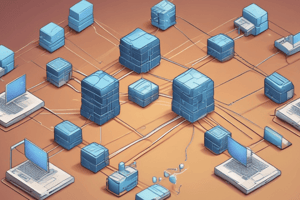Podcast
Questions and Answers
What is the primary goal of the presentation layer in networking?
What is the primary goal of the presentation layer in networking?
- Ensuring data is presented in a meaningful format (correct)
- Data compression
- Syntax conversion
- Data encryption
Which function of the presentation layer involves reducing the size of data without losing any information?
Which function of the presentation layer involves reducing the size of data without losing any information?
- Syntax Conversion
- Bandwidth limitation
- Encryption and Decryption
- Data compression (correct)
What is the purpose of encryption and decryption in the context of the presentation layer?
What is the purpose of encryption and decryption in the context of the presentation layer?
- Handling large amounts of data
- Ensuring secure transmission of sensitive information (correct)
- Data compression
- Syntax conversion
Which process involves translating data from one format to another in the presentation layer?
Which process involves translating data from one format to another in the presentation layer?
Why is data compression important in the presentation layer when dealing with video streaming?
Why is data compression important in the presentation layer when dealing with video streaming?
What is the primary purpose of SSL/TLS protocols in the presentation layer?
What is the primary purpose of SSL/TLS protocols in the presentation layer?
Which protocol allows for embedding images, audio, and video within emails?
Which protocol allows for embedding images, audio, and video within emails?
What challenge does the presentation layer face in ensuring data is not modified during transmission?
What challenge does the presentation layer face in ensuring data is not modified during transmission?
Which task is NOT typically handled by the presentation layer according to the text?
Which task is NOT typically handled by the presentation layer according to the text?
Why is ensuring compatibility between systems and applications a challenge for the presentation layer?
Why is ensuring compatibility between systems and applications a challenge for the presentation layer?
Flashcards are hidden until you start studying
Study Notes
Introduction
The OSI model, which stands for Open Systems Interconnection Model, is a framework used to understand how different communication systems work together. It features seven layers of abstraction that help simplify complex networking tasks by breaking them down into manageable parts. In this article, we'll dive deeper into one of these layers: the presentation layer.
What is the Presentation Layer?
The presentation layer is concerned with presenting data to applications in a meaningful format. This means it handles data compression, encryption, and decryption, among other things. Its primary goal is to make sure data can be understood and utilized properly between two parties communicating over a network.
Functions of the Presentation Layer
The presentation layer has several key functions, including:
Data Compression
Data compression is the process of reducing the size of data without losing any information. This is particularly important when dealing with large amounts of data, such as video streaming, where bandwidth limitations might otherwise cause issues.
Encryption and Decryption
Encryption and decryption involve converting plain text into ciphertext and back again using cryptographic algorithms. This ensures secure transmission of sensitive information across networks.
Syntax Conversion
Syntax conversion involves translating data from one format to another. For example, if a string of characters needs to be displayed on a computer screen, it may need to be converted from binary code to a formatted display format.
Protocols for the Presentation Layer
There are several protocols associated with the presentation layer. Some of the most commonly used ones include:
SSL/TLS
Secure Sockets Layer (SSL) and its successor, Transport Layer Security (TLS), are cryptographic protocols designed to provide secure communication over a computer network. They are widely used for establishing secure connections between web servers and browsers to protect sensitive data.
Portable Document Format (PDF) is a file format developed by Adobe Systems for document exchange. It provides a consistent appearance of documents across different devices and platforms.
MIME
Multipurpose Internet Mail Extensions (MIME) is an extension of the Standard Generalized Markup Language (SGML) used for formatting messages. It allows for the embedding of images, audio, and video within emails.
Challenges with the Presentation Layer
The presentation layer can face several challenges. Some of these include:
Data Integrity
Ensuring data integrity is crucial. If data is modified during transmission, it can lead to incorrect results or even security breaches.
Security
Ensuring security is another challenge. The presentation layer must protect against unauthorized access, tampering, and data leakage.
Compatibility
Ensuring compatibility between different systems and applications is also a challenge. The presentation layer must support various encryption algorithms and formats to ensure data is understood by both parties.
Conclusion
The presentation layer plays a vital role in the OSI model, ensuring that data is presented in a meaningful and understandable format. It handles tasks like data compression, encryption, and syntax conversion, and uses protocols like SSL/TLS, PDF, and MIME to facilitate these processes. Despite the challenges it faces, the presentation layer is essential for secure and efficient communication across networks.
Studying That Suits You
Use AI to generate personalized quizzes and flashcards to suit your learning preferences.




